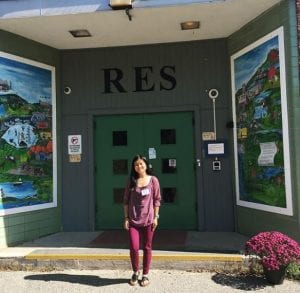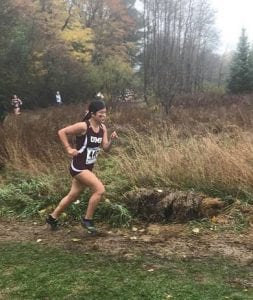Gwen Baker
Class of 2019
Early Childhood Education Birth-5; K-3
Windham High School
Windham, Maine
UMF’s College of Education, Health, and Rehabilitation Services (CEHR) was able to meet with Gwen Baker regarding her experience at UMF. She shared her insight on her program and how that will help her as a future Early Childhood Educator.

Gwen Baker at her Advanced Practicum experience in a 2nd Grade classroom at Rumford Elementary School.
UMF CEHR: Why did you decide to attend UMF?
Gwen: I chose UMF because when I visited it felt very friendly and welcoming, I really liked that. I felt comfortable at UMF and I wanted somewhere that made me feel that way. I also knew UMF had a history of being a great teacher education school and I knew I wanted the best education possible.
UMF CEHR: Why did you decide to choose the Early Childhood Education program? Do you feel that there is a content area you are excited to teach?
Gwen: I have always loved working with kids but on a mission trip in 2013 I realized just how much. It wasn’t until junior or senior year of high school when I realized I wanted to major in Early Childhood or Elementary Education. I chose Early Childhood because I knew that I wanted to teach the younger children and knew my passion lied within teaching. I enjoy and have strong skills in reading and writing and am excited to show students what they can learn. I am also excited to teach students about nature through theme-based learning.
UMF CEHR: Can you share more about the mission trip you went on?
Gwen: I went to the Dominican Republic to a village called Holonga, where we stayed for a week of the twelve-day trip. In the village, we taught vocational Bible school to children. We would take a story out of the bible and teach it to the children, they would act out the story followed by some activities. We had upwards to 100 children each day. Our leadership group had fourteen teenagers and five adults. We got to play with the students throughout the day, do other mission work and learn about their culture. My work with the children solidified my love for working with the youth. Children have so much to offer and I believe that we can learn from them every single day.
UMF CEHR: You have talked about nature-based education. Can you talk about how that is impacting your philosophy of teaching?
Gwen: Nature is beneficial in regards to teaching. My senior seminar paper is about how nature impacts children’s empathy, care, and kindness. It is more than just bringing your children outside, it is how nature is beneficial. You can teach science by identifying a flower, math by counting the petals and be connected back to reading about the flower types in the classroom. There are many ways to connect nature to the classroom and it gives students an enriched learning experience. Children are playing with mud pies through dramatic play which improves their cognitive development. Nature-based learning is very beneficial and we should make people more aware of the positive impact.
UMF CEHR: Was there a teacher in your life that believed in you and made you want to become a teacher? Can you tell us about the power of a good role model for a young student?
Gwen: I think it is important to be supportive and understanding to all of your students. We get stuck in [creativity] boxes sometimes where we do not allow our students to explore and be creative. If allowed to be creative and explore different things, we are opening up more learning opportunities. It is important that as educators we are not labeling a child for their strengths and weaknesses because it is hard to break from the label. One of my best teachers was my kindergarten teacher, although I did not know that at the time. She was in her first year of teaching and I felt that she really understood every student, understood me, and most of all, communicated with the families. My kindergarten teacher did a great job of differentiating for every student and understanding their needs as a learner. She was kind and patient with all of her students. I think being patient is very important [in an educator] and that was what made my experience in her class so memorable. Having a group of educators believing in you is really powerful.
UMF CEHR: Can you explain a positive experience that you have encountered within your time at UMF in your Early Childhood Education program?
Gwen: One of the greatest moments for me is when I am working with a child, one-on-one or in a group, and they might have previously struggled but after learning in a new way, they just get it. The student pushed and persevered and that is so powerful in itself but you know you helped the student get there! This is special to me because I impacted that student and that makes teaching so rewarding. Just seeing your work reflected on the children has always been a positive experience for me. One story that comes to mind, a second grade student was having a hard time coming up with an idea for a story. He kept saying “I don’t know what to write, I have too many ideas.” I told him to think about instances with his family or friends that you could talk about aloud then asked which one could you really go and go about in writing. The student got really excited about writing his story and it was obvious that he really enjoyed it. He kept putting himself down and felt that he could not do it but once I told him that he could do it, the student had a lot of confidence he could write. It was a really positive experience for me to see.
UMF CEHR: Can you tell us about your practicum experience and how that helped shape you as a future teacher?
Gwen: My first practicum experience was in a pre-K class at a local school and it really helped me learn what it was like to be in the classroom. I got to focus on students needs, planning lessons and learning about the standards. It allowed me to see what it was like to work with students who were four or five. My mentor was great! She suggested I try working with an older group of students, as she thought my vocabulary could be a bit mature for the younger students. My second practicum was in a 2nd-grade class and it was a perfect fit. It was an amazing experience. My mentor and I clicked and were always on the same page. She pushed me and really allowed me to explore to become a better teacher. My third experience was in an infant and toddler placement. They are always learning, too, and there is a lot that they learn but that was harder for me. I think it did lead to me becoming a better educator though, as I was able to see the foundation of what my students are coming from.
UMF CEHR: Can you tell us about your leadership role on UMF’s cross country team and how that will help you become a stronger teacher?

Gwen racing for UMF’s Cross Country team at the North Atlantic Conference championship, held at Troy Howard Middle School in Belfast, ME.
Gwen: There is a lot of things to focus on to have a happy and healthy dynamic team as captain of this year’s cross-country team. t. It is important to make sure the needs are met for each athlete and being aware of what is going on. If you are not together as a team, that will affect how you perform in the races. The same philosophy goes for your classroom. Your students will not efficiently learn what they need to if they are not showing proper leadership. My goal as captain was to be there for each athlete and show them I care. As a teacher, you want your students to trust you and come to you.
UMF CEHR: How does your minor in psychology prepares you to cognitively understand your students as a teacher?
Gwen: Psychology plays a big role and its beneficial because I will be able to understand the deeper reason. For example, why is Johnny acting out during morning meeting? He wants to participate but is there something going on behind the scenes, maybe at home. I am able to gauge the reason why and understand that a bit better. My minor will help me know what to do, how to be proactive and what resources to use to best help my students!
UMF CEHR: Being a senior, what do you hope to get out of your program and what do you hope to still learn?
Gwen: I hope to go into a classroom confidently knowing I will make a difference. We all have those moments of doubt, but to know that I am doing the right thing. Understanding how to manage everything; curriculum planning, engaging with families, and classroom management. Communication with families is super important. You can be a great teacher but if you do not communicate with the families that might impact your success as a teacher. If you do not understand what backgrounds and situations your students are coming from it makes it hard for you to teach mindfully. It is not going to be easy. There are things that you are going to be confident in and others not so much. Some years there are going to be classes you are challenged by and some years will be a breath of fresh air. Understanding that every student is going to be different and they are all able to learn. Students might not always be where you want or need them to be but all of that is part of teaching. I need to remind myself that the good and bad days will be there and I can do it.
UMF CEHR: Can you share some advice for underclassmen, who have or have not taken a practicum, on how to build that special student- teacher mentor relationship?
Gwen: Keep communication open. Communicating puts you out there and don’t be afraid to ask questions. As pre-service teachers, we are always learning from our mentors. Time management is important so I had a folder for each class to write every assignment and color-coded them. It really keeps me on top of things. There are going to be good and bad days but it is important to stay open-minded, true to your heart, and trust yourself. Taking on an extra semester is okay if it means being happy for the rest of your career. What matters is your education and what you want to do. Do not be afraid to speak up if there are legitimate concerns. Cherish your time here and take your learning to heart. Everyone wants you to succeed so take their feedback and see how you might improve.
